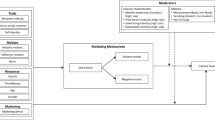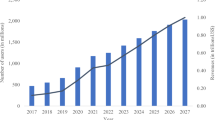Abstract
In this paper, we examine how a merchant should choose between discount promotion (offering a discount through an online third-party promotion platform) and coupon promotion (issuing on-package coupons directly to consumers). We develop a two-period model in which the merchant optimizes the promotion decision in the first period and does not promote in the second period. We identify two consumer segments: informed consumers who are aware of the merchant’s offering at the beginning of the first period and know the true quality of the product, and uninformed consumers who are not aware of the merchant’s offering at the beginning of the first period and underestimate the product quality. Moreover, the merchant has access only to informed consumers when adopting coupon promotion or when choosing not to promote, while the merchant can access both informed consumers and uninformed consumers when offering discount promotion. In this setting, we find that the merchant should offer discount promotion when the quality estimation of uninformed consumers is large and/or when the proportion of informed consumers is small; otherwise, the merchant should adopt coupon promotion when the effect of coupons in the first period is large and choose not to promote when the effect of coupons in the first period is small.
Similar content being viewed by others
References
Cabral L, Li LF (2015). A dollar for your thoughts: Feedback-conditional rebates on eBay. Management Science 61(9): 2052–2063.
Cao Z, Hui KL, Xu H (2018). When discounts hurt sales: The case of daily-deal markets. Information Systems Research 29(3): 567–591.
Chandon P, Wansink B, Laurent G (2000). A benefit congruency framework of sales promotion effectiveness. Journal of Marketing 64(4): 65–81.
Chen Y, Moorthy S, Zhang Z J (2005). Price discrimination after the purchase:Rebates as state-dependent discounts. Management Science 51(7): 1131–1140.
Cohen M C, Leung N H Z, Panchamgam K, Perakis G, Smith A (2017). The impact of linear optimization on promotion planning. Operations Research 65(2): 446–468.
Demiragabb O C (2011). Customer rebates and retailer incentives in the presence of competition and price discrimination. European Journal of Operational Research 215(1): 268–280.
Dhar S K, Morrison D G, Raju J S (1996). The effect of package coupons on brand choice: An epilogue on profits. Marketing Science 14(2): 192–203.
Edelman B, Jaffe S, Kominers S D (2016). To groupon or not to groupon: The profitability of deep discounts. Marketing Letters 27(1): 39–53.
Gao F, Chen J (2015). The role of discount vouchers in market with customer valuation uncertainty. Production and Operations Management 24(4): 665–679.
Ha A, Shang W, Wang Y (2017). Manufacturer rebate competition in a supply chain with a common retailer. Production and Operations Management Advance online publication. Doi: https://doi.org/10.1111/poms.12749.
Hu S, Hu X, Ye Q (2017). Optimal rebate strategies under dynamic pricing. Operations Research Advance online publication. Doi:https://doi.org/10.1287/opre.2017.1642.
Inman J J, Mcalister L (1994). Do coupon expiration dates affect consumer behavior? Journal of Marketing Research 31(3): 423–428.
Jain D, Mahajan V, Muller E (1995). An approach for determining optimal product sampling for the diffusion of a new product. Journal of Product Innovation Management 12(2): 124–135.
Kotler P, Keller K (2016). Marketing Management. China Renmin University Press.
Kwark Y, Chen J, Raghunathan S (2014). Online product reviews: Implications for retailers and competing manufacturers. Information Systems Research 25(1): 93–110.
Lu Q, Moorthy S (2007). Coupons versus rebates. Marketing Science 26(1): 67–82.
Martín-Herrán Guiomar, Sigué Simon-Pierre (2015). Trade deals and/or on-package coupons. European Journal of Operational Research 241(2): 541–554.
Ma S, Fildes R (2017). A retail store SKU promotions optimization model for category multi-period profit maximization. European Journal of Operational Research 260: 680–692.
Shapiro C (1983). Optimal pricing of experience goods. The Bell Journal of Economics 497–507.
Shivendu S, Zhang Z (2014). Economics of daily-deal business models. Theory in Economics of Information Systems (TEIS).
Soman D (1998). The illusion of delayed incentives: Evaluating future effort-money transactions. Journal of Marketing Research 35(4): 427–437.
Subramanian U, Rao RC (2016). Leveraging experienced consumers to attract new consumers: An equilibrium analysis of displaying deal sales by daily deal websites. Management Science 62(12): 3555–3575.
Xia Y (2016). Responding to supplier temporary price discounts in a supply chain through ordering and pricing decisions. International Journal of Production Research 54(7): 1938–1950.
Yang S, Munson C L, Chen B, Shi C (2015). Coordinating contracts for supply chains that market with mail-in rebates and retailer promotions. Journal of the Operational Research Society 66(12): 2025–2036.
Zhang J, Li J, Lu L, Dai R (2017). Supply chain performance for deteriorating items with cooperative advertising. Journal of Systems Science and Systems Engineering 26(1): 23–49.
Zhang Z, Shivendu S, Wang P (2019). Is investment in data analytics always profitable? The case of third-party-online-promotion marketplace. Available at SSRN: https://ssrn.com/abstract=3486495.
Acknowledgments
We are grateful to the anonymous referees for their insightful and constructive comments and suggestions, which have helped us tremendously improve this paper. Thanks to the editor of this journal for the positive feedback. We also thank Professor Zhe Zhang from the University of Texas at Dallas for his comment. This research was supported by the National Natural Science Foundation of China under Grant No. 71771184 and partially supported by the Key Project of Shaanxi International Science and Technology Cooperation through Grant No. 2018KWZ-04. Qiying Hu also acknowledges financial support from the National Science Foundation of China(NSFC) under Grant No. 71671046.
Author information
Authors and Affiliations
Corresponding author
Additional information
Peng Wang is a PhD student at Xidian University, Xi’an, Shaanxi. He got his bachelor’s degree in management from Xidian University. He was a visiting scholar in The University of Texas at Dallas, USA. His general research interests are in e-commerce, economics of information systems, platform economy, and online promotion. His papers have been published in academic journals and conferences, including Journal of Systems Science and Systems Engineering and INFORMS Annual Meeting.
Rong Du is the Huashan Scholar-Chair Professor of Management Science and Engineering at the School of Economics and Management, Xidian University, China. She got her bachelor’s degree in information control engineering and master’s degree in technological economics from Xi’an Jiaotong University, and a PhD degree in applied mathematics from Xidian University, China. She did her postdoctoral research in the Department of Management Information Systems at the University College Dublin, Ireland. She was a visiting professor in Georgia State University, USA. Her research interests include knowledge management, information systems, and E-commerce. She has published papers in journals such as European Journal of Operational Research, Expert Systems with Applications, Journal of Strategic Information Systems, International Journal of Information Technology & Decision Making, Electronic Commerce Research, etc. Dr. Du is a scholar of the New Century’s Excellent Talent Supporting Program selected by the Ministry of Education in China.
Qiying Hu is a professor with the Department of Management Science, School of Management, Fudan University. He received his B.S. degree in mathematics from Hangzhou University, China, M.S. in applied mathematics from Xidian University, China, and PhD in systems engineering from Konan University, Japan. His research interests include supply chain management, business model, and service management. He has been the author or coauthor over 150 research papers published in journals such as Production and Operations Management, Naval Research & Logistics, European Journal of Operations Research, and International Journal of Production Economics; and the author or coauthor over 15 books.
Rights and permissions
About this article
Cite this article
Wang, P., Du, R. & Hu, Q. How to Promote Sales: Discount Promotion or Coupon Promotion?. J. Syst. Sci. Syst. Eng. 29, 381–399 (2020). https://doi.org/10.1007/s11518-020-5457-1
Published:
Issue Date:
DOI: https://doi.org/10.1007/s11518-020-5457-1




